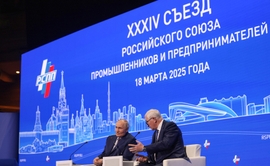Iran's Acting President Mohammad Mokhber has hailed the strengthening of relations with China in recent years, which has seen significant growth in cooperation, especially in the energy and transportation sectors.
In the ceremony of receiving the credentials of the new ambassador of the People's Republic of China, Cong Peiwu, on July 2, Mokhber described the relations between the two countries as “strategic and based on unchangeable principles”, according to the official website of the Iranian president.
Mokhber described the comprehensive long-term cooperation document signed between Tehran and Beijing as significant and said that “implementing this document and facilitating private sector activities in both countries are the most important joint agendas”.
Iran and China signed a 25-year strategic cooperation agreement in March 2021. The accord brings Iran into China's Belt and Road Initiative, a multi-trillion-dollar infrastructure scheme intended to stretch from East Asia to Europe. The project aims to significantly expand China’s economic and political influence, and has raised concerns in the United States, which called the document a source of Chinese "colonialism".
The Iranian acting president called the strengthening of relations in recent years as a sign and symbol of the diligence and synergy of the high officials of the two countries in taking great steps for the benefit of the two nations.
While appreciating China's strategic stance against unilateralism, Mokhber also praised Beijing's cooperation with Tehran in various international arenas, including its membership in the Shanghai Cooperation Organisation (SCO).
In this meeting, the new ambassador of China also described the bilateral relations as “dynamic and progressing”, saying that “China has always viewed its relationship with Iran from a strategic perspective, and pursues the development of interactions with Iran unaffected by global changes and transformations”.
He said that the development of relations between the two countries has broad dimensions and specific objectives and expressed his country's interest in expanding cooperation with Iran in the field of new energies, as well as increasing interactions within regional and international organizations and agreements, including the SCO.
As Iran's most important economic or trading partner, Beijing is looking for opportunities in Tehran on other levels. It has a geostrategic and geopolitical need in its rivalry with the US. In 2023, Iran and China signed 20 additional memos of understanding on trade, transportation, technology, tourism, agriculture, and crisis response to take more specific steps on the earlier accord.
Iran exports about 1.3 million barrels of oil to China per day. While the Iranian government heavily relies on Beijing as its primary oil customer, the actual data on bilateral economic relations appears less promising for the sanctions-stricken country. Because of the US sanctions imposed on Iran, China is being deterred from deeper economic integration, as Chinese companies face third-party sanctions if they are caught buying goods from Iran.
Iran's placement as China's 38th trading partner, with trade volume not exceeding $32 billion in 2023, falls significantly behind several neighboring and regional rivals. Saudi Arabia, for instance, boasts a trade volume with China of $107 billion, followed by the UAE, Iraq, Türkiye, and Oman.







 Azerbaijan’s historical biographical film “Taghiyev” has won the Best Feature Film award at the Dehancer Colorist Awards 2024. The film, which chro...
Azerbaijan’s historical biographical film “Taghiyev” has won the Best Feature Film award at the Dehancer Colorist Awards 2024. The film, which chro...
 Azerbaijan has been recognized as one of the safest countries in the world, ranking 90th among 163 countries on the Global Terrorism Index 2025 (GTI).
Azerbaijan has been recognized as one of the safest countries in the world, ranking 90th among 163 countries on the Global Terrorism Index 2025 (GTI).
 The Azerbaijani Defense Ministry has reported ongoing shelling of its army positions by Armenian forces since last week.
The Azerbaijani Defense Ministry has reported ongoing shelling of its army positions by Armenian forces since last week.
 Nine years have passed since a bloody escalation of the Armenia-Azerbaijan conflict that was later dubbed the April War or Four Day War.
Nine years have passed since a bloody escalation of the Armenia-Azerbaijan conflict that was later dubbed the April War or Four Day War.
 Azerbaijanis around the world are commemorating March 31 as the Day of Genocide of Azerbaijanis, which took place 107 years ago and is considered o...
Azerbaijanis around the world are commemorating March 31 as the Day of Genocide of Azerbaijanis, which took place 107 years ago and is considered o...



